
Atomic Rooster - Resurrection!
Atomic
Rooster/Death Walks Behind You/In Hearing Of ( 1970-71)
Box Set:
Akarma 167 1/ 2/ 3 (also available
separately)
Made in England (1972) Akarma 177
Nice and
Greasy (1973) Akarma 178
Headline News (1983) Voiceprint 171
nucleus: Vincent Crane - organ, piano, vocals
fissile
elements: John Du Cann/Pete French/Chris Farlowe - lead vocals
John Du
Cann/Steve Bolton/Johnny Mandala/John Mizarolli/Dave Gilmour/Bernie Torme -
guitars
Carl Palmer/Paul Hammond/Rick Parnell - drums
Nick Graham -bass
(first album only)
plus occasional strings, brass, session singers
The Resurrection of Atomic Rooster? A doomed project, in the literal sense. Founder member Vincent Crane (aka Vincent Cheesman) swallowed four hundred Anadin tablets on a stormy St Valentine's Day in 1989 while long-time drummer Paul Hammond overdosed on methadone in a London bedsit a couple of years later.
Surviving sidemen are still active, rolling or tumbling as the shifting foundations of the music business dictate, and from time to time there are rumbles of proposed Rooster revivals or tribute bands. But Rooster without Vincent Crane is Hamlet without the Prince, the Pack without the Joker.
"Now you see him , now you don't." Vincent's trickster fingerwork has just made the Ace of Diamonds vanish before the blinking gaze of adolescent Brother P, already impressed with his friend's remake of King Kong as a 9.5 mm b&w dynanimation short, using a plasticine ape and a wrecked toy train.
Now this mercurial prankster starts to show off on the parlour piano. Thundering two-fisted music rolls over everything else they've ever heard, hooking them with its all-night drive, that relentless bass and underlying minor-key menace. Soon VC will find practicing boogie more compulsive than rehearsing the Disappearing Rabbit caper. It's 1962 and London is about to be hit by the Blues Boom...
Your reporter was on the Crane case very early, caught both the radiance and the fall-out. By '63 VC was moonlighting from music college, to hang around the London R&B scene, looking for support gigs at the Marquee or the Flamingo. Graham Bond, that Crowleyite arch-druid of the Hammond organ, introduced him to the grooves of Jimmy Smith and John Patton, and gave him a template for his early jazz-blues bands. I tried to fit my poetry into his jazz via the Word Engine with Pete Brown and others, and promoted various long forgotten Crane operations - the Big Sound, the Freedom Riders, the Vincent Crane Combo.
Then we hit the cross-roads. I left the UK in 1968 for a four year spell in Canada. The Combo had rapidly evolved into the Crazy World of Arthur Brown. In a matter of months, Vincent had co-written the incendiary number one hit Fire, had embarked on a hyperactive tour of the US and then plummeted down into the first of many chasmic depressions. In 1969, after another eventful American tour, he founded his first Atomic Rooster, with former Crazy World inmate Carl Palmer.
Between 1968 and 1972 we only met once, when Rooster supported Savoy Brown at Vancouver's Kerrisdale Arena. ( Culture Court's Ojo remembers the gig, vividly if not favourably) Then, as his first marriage collapsed in the early seventies, Vincent started to rediscover old friends, and our lives overlapped once more, in a collage of grandiose projects and desperate stratagems.
Torquay, Christmas 1977. Vincent has just released Firefighter, a self-pressed Atomic Records single satirising the first UK firemen's strike. He's convinced that the Callaghan government has conspired with the BBC to keep it off the radio, because if everybody heard it, its dynamic vibes would end the dispute. That's why we had to give it away in pubs.
We also have to be silent while the Queen's Speech is on TV, because she has an important message especially for us. "We gotta sort things out in Northern Ireland. I'm going to take a band over, set up a huge tour, entertain all the armies - troops, RUC, Provos, the whole fucking lot...that'll keep 'em quiet "
Jean, his new wife/muse/roadie/minder/chief electrician catches my eye. Vin's ramping up to another big one. Like 1975, when he started bricking up the front door to keep the bailliffs out. Yet last night , sitting in with my local punk/blooze band, he was in total control, aware of everything happening on the stand, playing the audience as easily as he ravished the keyboard of the C3.
So this case-history of his best-known work abandons any pretences to objectivity. But a few time-capsule fragments might place these de luxe Akarma/Comet re-issues in a wider context.
Atomic Rooster 1970
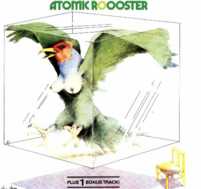
This first album embodies some of the disparate elements in early British progressive rock. Nick Graham's grainy vocals strive for self-authentication via a construction of white negritude, John Du Cann's guitar (over-dubbed for the US market) dives full-tilt into the spaces ripped open by Hendrix, while Carl Palmer plays flash jazz tricks all over the drum kit. Lyrics address persons of female gender either as potential band-wagon harlots or angels with broken wings. Crane's Hammond pyrotechnics burn with the hot licks of the Blue Note organists, especially on the magnificently demented instrumentals like Before Tomorrow but when he sits down at the Bechstein for the ballads, a nostalgia for Chopin and Debussy creeps in.
These conservatoire influences are also evidenced in his scoring for a few tracks - french horns, flute, or cello rather than jazz horns. Such neo-classic pomps were later to take monstrous shape in the outpourings of Rick Wakeman or the Electric Light Orchestra. But throughout this album, the classical colorations are restrained, underscoring the mood of melancholy and uncertainty in Crane's melodies or lyrics.
For both the lyrics and sound of the opening track, the ominous but frenetic Friday The 13th, foreshadow dominant Atomic Rooster themes - death and all-pervasive paranoia. "Everyone's lonely when they die/ No-one will save you, they won't try, " screams the front man, over the choppy drumming and convoluted organ lines. The archetypal sixties dude thus addressed is "walking down the road/footsteps close behind..." A possible allusion to the Man, the Heat, the Pigs or other ogres of the emergent dope culture; but the song also glances over its shoulder at a much older adversary.
Other tracks reflect the downward spirals in Crane's early cycles of manic depression. The mournful adagio-like Banstead refers to the London mental hospital where he arrived off the plane from an American tour in a strait-jacket and encountered his first dose of ECT. Brooding organ and strings underwrite this doom-text. "Please take me out of this place/I know I'm never gonna learn..."
Winter is carried by a gentler vocal, the melody slowly lilts to the sound of cello and piano and there's a strange pastoral interlude with jazzy flute solo, anticipating the antics of Jethro Tull, but the mood is self-elegiac. "Look in the mirror and all I see is time/ Stare at the remnant of a life that once was mine."
In Decline and Fall they pump up the tempo, "the churning propeller of the submarine organ agitates in compressed air" , and Palmer roars through an extended drum solo before the piece segues into exultant vocals, a rush of dangerous euphoria: " I see my name written on the sun...who will catch me when I fall...?"
The Sun " the UK's best-selling soar-away tabloid" reported Vincent's eventual suicide nineteen years later. As is their custom, Rupert Murdoch's boys made several basic factual errors.
Death Walks Behind You
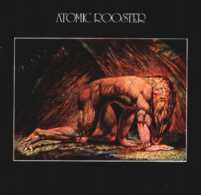
Vincent's school-teacher parents Tom and Renee Cheesman were artistic and mystical. They wrote and painted, held bohemian soirees, admired Gurdjieff and Ouspensky. Renee had named Vincent after Van Gogh, and Tom admired William Blake.
Yet VC's choice of Blake's 1795 Nebuchadnezzar engraving for the sleeve may have been more than a attempt to reconcile the raucous new rock culture with the high-culture aspirations of his upbringing. For Blake, the biblical king crawling among beasts and devouring grass symbolised a forced spiritual descent, a fall into the material world. The spirit enters heavyweight matter, a harsh mineral universe of death and pain. It's an apt signifier for the heaviest and most metallic of all Rooster albums.
For some hard-core Roosterferians, this is the dread essence, the definitive statement by a neutron-star line-up - Crane/Du Cann/Hammond - which smelts the crudities of Black Sabbath or Iron Butterfly into a deep alchemical fusion reaction. Organist and guitarist lock horns with a demonic intensity. In manic instrumentals like Vug and Gershatzer they trade licks as if they were playing catch with hand-grenades, exploiting the full potential of the Leslie speaker and the Marshall amp to create an interplay of deep shivery harmonics.
The title piece, with its brooding keyboard intro and death-march guitar riff, risks melodramatic absurdity but after thirty years it survives like a vintage Hammer film, beyond all irony. All the elements - the ritualistic chant of the vocals, the menacing gallop of that descending guitar figure, the slow gospel piano bridge - are fused together by a total conviction. " Start to scream/shout for help/there is no-one by your side...Death walks behind you..." It's hardly surprising that the track has recently been included on Britannia Infernus, a compilation covering three decades of British Black Metal.
There's the same anxiety at work in Du Cann's songs like Seven Streets, reinforced by the doomwatch organ and crunching guitar chords, while Sleeping For Years and Can't Take No More present dead-end relationships, no-hope liaisons. The Perfumed Gardens of Love circa 1967/68 (always a flickering mirage, even when they were supposed to be happening) have become wastelands of irrational paranoia. Crane's chart hit Tomorrow Night seems charged with dark sexual tensions. "When I wake up in your bed/I can still hear what you've said/like a bad dream/I can't fight..."
In Hearing Of
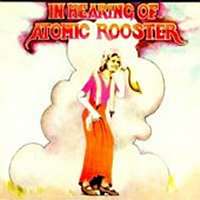
Vocalist Pete French was added for this third album and his gruff South London delivery takes Rooster closer to the hard rock mainstream. But mystical undercurrents still swirl uneasily through the music. Vincent may have read his Gurdjieff, just as he spread and re-spread the Greater and Lesser Arcana of the A.E Waite Tarot Pack, monitoring the regular appearances of the Magician, the Hanged Man, or the Tower Struck by Lightning. Yet, as an experienced stage illusionist, he also took a great relish in the exposure of dodgy mediums and dubious gurus, " your old Madam Blavatski trap-door caper."
This conflict of interest, typical of so many artists caught by the undertow of the sixties esoteric revival (Page, Bowie, Bond , to name a few) surfaces in tracks like Breakthrough: "I wait for a vision/I search for a sign...There may be a god /but there isn't a key..." The song hints that these grand yearnings might be reduced to a neural short-circuit:" There isn't a god, the jailer is me..." The urgent riff lifts the lyric above mere New Age musings and gives it a weird poignancy.
The ballad Decision/Indecision has similar undertones, read in the context of VC's mental history. "I'm going to find the way back home/ find a way to become what I am" while the slow lurking funk of "Black Snake", evoked in an insinuating vocal by VC himself, plays on a range of archetypal resonances. "Tell me, sister, tell me child, what makes you feel so wild...?" "Black snake living in a black hole/hiding from the sun.." That old black snake gets into everything.
Like all the Akarma releases, this one contains a number of bonus tracks -live gig recordings or singles, like Du Cann's song Devil's Answer, AR's biggest chart success. Which leads us to a frequently-asked question: were Atomic Rooster a cabal of closet Satanists?
Made in England
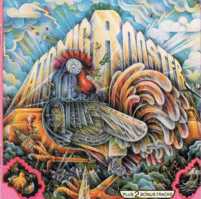
"Keep on rocking, ride along now - Satan's wheel/Keep it turning..." Tracks like Satan's Wheel or All in Satan's Name might suggest an ongoing affiliation with self-professed diabolists like Black Widow, who created a brief frisson in the seventies with their theatrical "virgin sacrifices." But the songs on Made in England evoke a desperate attempt to escape from Satan's wheel and its "perpetual motion... spinning words of hate".
In his book Tech-Gnosis Erik Davies has suggested that the children of the sixties were neo-Gnostic without knowing it. Here there's certainly a sense of the physical world as a death zone, a psychic prison controlled by dark conspiratorial forces. Maybe such pieces could be heard as a response to a social phenomenon, Crane and co seizing on a mood in the counterculture, the seventies downturn from that brief sixties spasm of utopian euphoria. But so much of his output can also be read as a projection of his battle with the inner demons and the exhausting cycle of manic depression.
The sound of Made in England is drastically different from the heavy vibe of Death Walks Behind You. French is replaced by the blue-eyed soul veteran Chris Farlowe, who moves easily from down-home rasp to gospel falsetto and rides high around Rick Parnell's funky snare beats, Steve Bolton plays fast wah-wah guitar, while Crane frequently plays electric piano and adds stabs of strings or brass.
The overall effect is a kind of psychedelic soul, closer to some of Norman Whitfield's Motown arrangements (e.g Ball of Confusion for the Temptations) than the death-watch sound of early Rooster. Some of the pieces are pleasantly bizarre, especially over a fierce funk thrash: "I'm a space cowboy/riding the ranges of the universe" while others might refer to music industry management strategies: "People - they'll always do you/People- they're out to screw you..."
For some purists in the AR demographic Made in England marks a betrayal, and it can't be denied that it didn't sell as well. Others feel that songs like Time Take My Life aligned the band in an interesting new direction. The message is still bleak and unadorned . "Life's a prison and death's the key..." But the number drives with an exhilarating pace and attack, a twitchy restless groove that confronts the signification of the lyric head-on.
Nice and Greasy
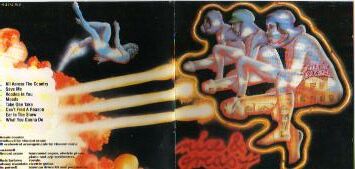
The original artwork for this album featured a joint stubbed out in a fried egg. We do not know what VC would have made of the laser-emitting flying penises devised by Akarma. Certainly the band seems to have lost focus, after the experiments of Made in England and there's a hint of weariness in Vincent's ironic sleeve notes. "This track is best heard in the family crypt at midnight while a full moon chases shadows through the tombstones - or a service station on the motorway which comes to much the same thing..."
The space-funk instrumental work is still strong and Johnny Mandala (aka Goodsall) plays high-velocity licks, as Farlowe struts through a blues about the problems of distributing cannabis, as well as a loose Ray Charles pastiche. There's a moody cover of the Johnny Jenkins/Jackie Avery swamp rock classic Voodoo in You but the album as a whole doesn't have the distinctive presence of the earlier work. The band were approaching the end of their deal with Dawn - perhaps there's a feeling of duty, rather than pleasure in this session, which even the radiant cocks can't disguise.
Headline News

You can find other Rooster material around, like an EMI album of 1981 where Du Cann and Crane tried to re-forge the sound of their metallic years, as well as re-issues of broadcasts, live albums and compilations. You can investigate VC's work with Rory Gallagher, Peter Green and Dexy's Midnight Runners, as well as the projects with Arthur Brown. And one of these days the jazz poetry tapes recorded with Brother P might surface from the archives.
But I've chosen to focus on Headline News. Your correspondent lived through it.
Winter 1982/83. Vincent and Jean are now the landlords of a five-storey terrace mansion in West London's raffish but increasingly fashionable Maida Vale district. It is divided into a warren of apartments. After five years of struggling with collapsing sewers, peeling stucco, wobbly porticos and an odd menagerie of inmates -as well as the rhythms of his own madness - Vincent has managed to buy the property outright. And I am now one of his tenants.
Cathy & I share the top flat with a few minor criminals in the music industry and an amiable chap who enjoys making parachute jumps off high-rise buildings. Crane tells me that my role is to keep them in order and make them pay the rent , but it is as futile as trying to collect protection money from the Mob. Rival music systems battle all night while washing and cooking zones are terminally entropic.
Yet they who dwell in the House of Crane are privy to great wonders. In the evenings there's often lavish hospitality in Vincent and Jean's ground-floor apartment, with impromptu jams, readings, parties and performances. Crane entertains us with amazing tricks, including an elaborately staged demonstration of "telepathy" for which he has to memorise complete paragraphs from scores of different books scattered about the flat. He talks about Bunuel's films and mystical cosmology and how to make your own chaise-longue.
However, what preoccupies him most is the new album. It's going to be different from earlier work, more subtlety, unexpected moods and textures. Jean's collaborating on the lyrics. And he's going to record it right here in the huge living room. He's inviting local talent to guest - Pink Floyd's Dave Gilmour only lives round the corner.
Vocals? No problem! Every morning for weeks now we've overheard Vincent working out on selections from Gilbert & Sullivan: "I am the very model of a modern major general!" He insists it's excellent for improving diaphragm control and diction. Tom "Tubular Bells" Newman will engineer and produce.
Soon it's happening. To the consternation of the local residents' committee, Mr Newman has parked a huge old hippy bus full of Studer recording kit outside, regardless of the bye-laws, and multi-core cables snake through the plane trees of Clifton Gardens into Mr Crane's front room. Drummer Hammy, prised out of his bolt-hole in Willesden while he is still sober, looks suspiciously at a new Roland drum machine. Crane has also added DX7, Prophet and Moog keyboards to their arsenal. These guys are going to lay down some heavy tracks, if it takes all night long...
Headline News : The title track moves to an odd loping beat, as relentless as the rhythm of a talk-radio music bed, with spectral background mutterings fading in and out of the mix. After twenty years several words in the lead vocal still elude me - but Crane seems to be acting out the process of being mediated, unwittingly becoming a Warholian micro-celeb through some moment of madness.
Taking a Chance : The most conventional track on the album, a straight-ahead upbeat pop rocker about breaking away from the past, seeking freedom and following the dream, big plaster-shaking guitar solo from the mighty Miz. No surprises here.
"But I wrote it about you, you bugger!" VC insists, grinning as he takes another toak from his giant brass ashtray. And it's true. The reason we are here minding the garret at Clifton Gardens is because I've had another spasm of belated teen revolt and have jacked in my job at a rustic technical college in order to seek my fortune on the streets of London. Why Vincent should find this inspirational I don't know, but it's flattering. He plays the rough mix again. And again.
Machine : Staccato riffs and fuzz guitar from Bernie Torme as backup singer Tareena Craze repeats the obsessive hook: "You are a machine." These days you'd sample and loop her but in the analogue years VC preferred as far as possible to record "as live." Frantic organ and vocals wind up the tension.
A simple hard-rock take on the plight of industrialised man and his slavery to the rhythms of mass production? It's tempting to take it that way, but perhaps we should look at Gurdjieff again, especially as popularised by Colin Wilson: "Man is a machine... a robot... if he must learn to rise above his mechanicalness he must learn to understand the machine.... What Gurdjieff did was to turn people into well-balanced and self-aware machines." Maybe Crane's lyric dramatises his struggle - our struggle - to wake up from a robotic dream of everyday consciousness: "Stare into the sun/become one incandescent ray..."
Metal Minds : "Metal minds will keep you warm tonight..." The piece has a curious period aura and evokes images of huge IBM mainframes but cyber-paranioa and fear of dehumanisation were relatively new themes in early eighties rock. Whereas Kraftwerke and their clones couldn't wait to be interfaced with silicon lifeforms, our flesh and blood Anglo-hippies were still faithful to the certainties of bone and tissue, would risk the unpredictability of organic neurons and synapses. The pulse is slow, the mood is sombre, VC's vocal is filtered and remote. Now that most music industry product is generated by MIDI technology, the track has a certain prophetic resonance.
Dance of Death : Several influences at work in this grand guignol microdrama. Phrases in the opening verses bear a passing resemblance to an early PG poem The Black Museum while the shadow of Max Von Sydow in Bergman's Virgin Spring is evoked in the "game of life" played out in the narrative. Some listeners report that the bridge section evokes a danse macabre of mediaeval flagellants, acted out over a massive organ chord and massed percussion.
2.30 am. We shift uneasily in our narrow bed, as the joists and floorboards vibrate to the danse macabre four storeys below, now in its fifth take. The flagellants keep dropping a beat or missing a cue. Engineer Tom is probably running out of beak food. The primal rhythms are at this point deeply embedded.
Time : A return to the underlying melancholy, the eternal themes - time and mutability and flux - captured in another of Vincent's neo-classical song structures. A reflective piece, harking back to Winter on the first album and a muted finale for a band so often associated with dive-bomber guitar and organ pyrotechnics.
Hold Your Fire : Chilly oscillator arpeggiations and the low-flying drone of synth basslines throb underneath Crane's vocal which is lighter, drier, less florid than earlier Rooster-crowers. He's singing about death again, the randomised modes of its delivery in the pre WW III doomscape, "the distant plane heard in the dark... a gunman crouching in the shadow..." and the old terminal question: "Where do we go from here?" After the bridge, he arrives at an apocalyptic long-range scenario: "...ten thousand years/the world forgotten/a burning fragment lost in space...."
Cathy and I have been on the marches. Poets against the Bomb, Grandmas against the Bomb, small children in prams against the Bomb. The Bomb rolls steadily through all our dreams with a deepening rumble as the cruise missile bases are prepared at Greenham Common. War Plan UK is published, revealing the existence of at least two hundred nuclear targets on Air Strip One. There's a small boom in fall-out shelters.
From my review (August 83) in the now-defunct London alternative mag City Limits: "Dave Gilmour plays minimum notes with maximum effect as the slow thunder of the track rolls past, Crane shouting for us all against the impending storm..."
The Beginning of the End
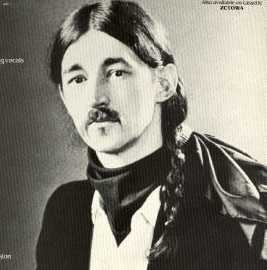
The album didn't sell, and the sudden defection of Towerbell Records' chief executive to foreign parts didn't help with marketing or distribution. As reported elsewhere, Crane dissolved Rooster and accepted the piano chair in Dexy's Midnight Runners, a role he carried out with great professionalism.
However, the pressures and self-induced personal complications surrounding a prolonged Dexy's recording session in Switzerland over the summer of 1984 provoked another chain of manic escapades followed by a spiral dive into depression and enforced hospitalisation, a pattern that was repeated with variations until his death. In the brighter interludes he still played, did casual gigs and enjoyed holding court in Clifton Gardens. Until he reached a psychic zone where none of us could follow him.
The events of those last five years are too turbulent for a neat precis. There's a book lurking in there. I did attempt a poem.
Meanwhile you have these strange haunting albums, and I have grainy memory-clips: a skinny seventeen year old in a floppy suit pacing a pebbly beach; two kids, one skinny, one owlish, racing the dodgem cars at Alf Botton's Amusements on Wimbledon Common; and, very faint, the seven year old who pushed me off a garden wall and then rushed away, distraught: "Help... I've killed Paul..."
©Paul A Green 11/2002